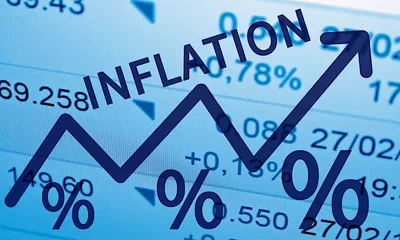Comments and Issues
An Essay on Silence
Published
4 years agoon
By
Olu Emmanuel
By Hope O’Rukevbe Eghagha
Silence means absence of sound. It also means absence of noise, that is, absence of that which is realized with the vocal cord or two metals in physical contact or any medium through which sound is communicated. It could also mean prohibition from speaking. Prohibition by the powers-that-be in any setting- the church, school, clan, community, state or country.
In apartheid South Africa, some African activists were banned from speaking to the media. Others were banned from being quoted in the media. Winnie Mandela was banned, for example, from speaking to any audience by the scoundrels in power during the years of struggle. Power holders who are afraid of ideas ban some people from being heard. Such persons are forced into silence.
A prison sentence forces activists into silence too because access to the organs of mass communication or social media are restricted or blocked. Once Nelson Mandela and the other leaders of ANC were sentenced to life imprisonment, the world could not hear their voices till they were released some twenty-seven years later. When Ken Saro Wiwa who championed environmental degradation in the Niger Delta was killed by the Abacha junta, his physical voice was silenced. When war-time Head of State General Yakubu Gowon detained Professor Wole Soyinka in 1967, after the latter returned from Biafran territory, the poet’s voice was silenced, albeit for a while. His silence was loud on world stage. He became a symbol of defiance to a dictator. Before the advent of social media, exile was an automatic imposition of silence in the home country. Not anymore. On social media, you can be heard in your country even if you are on exile in another continent.
Just as there is compelled silence, there is self-imposed silence too. This happens when a man decides to keep his views to himself. Late Chief Bola Ige one time Governor of old Oyo State and later Minister of Justice and Attorney General, spoke about ‘siddon look’ when he was fed up with the shenanigans of the Abacha regime. But silence could also convey a powerful message, sometimes very menacing. To say nothing when one ought to say something could be poignant, pregnant with meaning. It is silence that is often louder than noise or voice. Silence is saying nothing but meaning something. In the polity silence could mean watch or wait and see. It could mean expression of or the result of fear.
Silence which is caused by fear is dangerous to the polity. This is when advisers, close aides and state officials go into the silent mode because the boss may not want to hear their views. They know that if they proffer views that are taboo to the powers-that-be, they would lose their privileges. Of such silence we must beware. It is a sure road to the grave. Silence of this nature, therefore, must be avoided by leaders who wish to succeed.
There is a popular saying: silence means consent.
There is yet another saying: silence is golden.
These two sayings are applicable in different circumstances. Silence means consent arises when there is an allegation and the victim refuses to deny or confirm the allegations. On the other hand, silence is golden when one is not willing to be dragged into an argument over what he considers frivolous, in the hope that not joining the fray would make the matter go away.
Silence could also mean respect for some codes, written and unwritten, especially after one quits the seat of power or falls out with the hierarchy in an organisation. Here it is dignifying to remain silent, not to wash dirty linen in public, not to attract a backlash from those who guard or claim to guard the sanctity of the group.
When one is not sure about a situation, silence is best option. No speech. No noise. Absolute withdrawal from the cacophony. Tongue should be glued to the mouth roof top. Thinking gear should be engaged. One should examine the situation.
Sober reflection. This throws the other party into confusion. Words uttered from a confused mind could send mixed messages. Could compound the situation. Could compromise the target.
Remember that once words go into the space, they cannot be retrieved. That is why Poet Niyi Osundare says the word is an egg. Once an egg breaks, that is the end of the egg, the end of the matter. Forever. It was the spilled word that ended the career of that big man in politics. That big man in religion. That big man in the bank. That big husband in the family. The power of the spilled egg is anecdotal, archetypal.
Silence could be eerie. Scary. Foreboding. The quiet before the storm. Before the claps of thunder descend on the land. Between the flash of lightning and the clap of the roaring thunder, that silence is not comforting. The word of silence, the message of such silence can be a marker. Not to be taken lightly.
There are times when the presence of a man or a woman or an idea or a reaction means the absence of silence. That which is, is an indication therefore that to be is refusal to be not heard. That presence itself is a sign of provocation or threat to some. But the silence which the scared forces desire is a permanent feature of the cosmos. It is the reason we are here. It is the reason we stand, the reason we walk, the reason we live and the reason we die. Death is silence of a sort. But it is also a sign that we once were.
For some your silence is a threat. Your voice is also a threat, is noise. They would that you do nothing, say nothing, vanish out of existence. Evaporate. Disappear. And not vanish from the planet. Your evaporation should not be on record.
No one should know you existed, that you vanished should not be known. Else, your silence through evaporation would be a threat too!
Trending

 Health7 days ago
Health7 days agoDeclassified CIA memo explored concealing mind-control drugs in vaccines

 Crime1 week ago
Crime1 week agoSenior police officers faces retirement after Disu’s appointment as acting IGP

 Comments and Issues1 week ago
Comments and Issues1 week ago20 Critical Fixes to Save Nigeria’s Democracy from Electoral Fraud

 Latest1 week ago
Latest1 week agoICPC yet to respond to El-Rufai’s bail request as arraignment date looms

 Comments and Issues1 week ago
Comments and Issues1 week agoGovernance Before Guns: Why Institutional Coherence Determines Security Outcomes

 Comments and Issues1 week ago
Comments and Issues1 week agoWho owns Abacha’s loot? Nigeria and the fight for the people’s money

 Latest6 days ago
Latest6 days agoFubara pledges collaboration with APC lawmakers after Rivers by-elections

 Comments and Issues1 week ago
Comments and Issues1 week agoShooting down inflation and rising poverty

